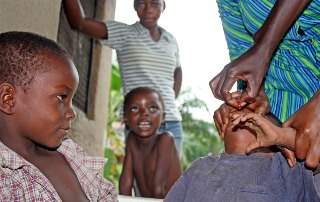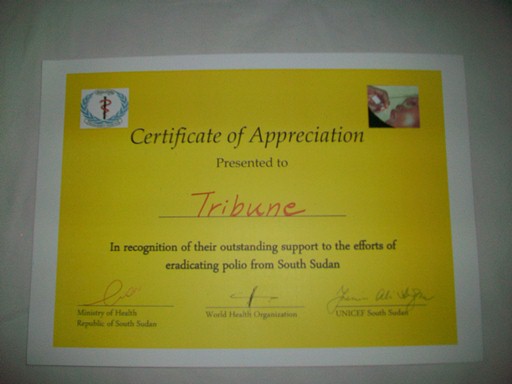Jonglei: Polio campaign commences amidst insecurity fears
By Julius N. Uma
March 26, 2012 (JUBA) – As South Sudan’s campaign against polio got under-way on Tuesday, health experts expressed fears that the three-day house-to-house exercise could face serious setbacks due to insecurity in Jonglei State.

The UN estimates 120,000 people have been displaced by the conflict in Jonglei; a state with a total area larger than that of North Korea.
An assessment of the polio situation in South Sudan produced by the Ministry of Health, shows that Polio, which can result in partial or complete paralysis, is a significant problem in South Sudan.
The World Health Organization (WHO), the UN Children’s Fund (UNICEF), the US Agency for International Development (USAID), the Japanese government, the Center for Disease Control and Prevention (CDC),and Rotary International are assisting the Ministry of Health with the programme.
Worldwide efforts in the last two decades have reduced the number of polio cases by 99 percent. According to Abdi Aden Mohamed of the WHO, although significant funding has been allocated to fight polio, the campaign to eradicate the disease can only succeed if there is the political will from the government.
Cathy Groenendijk, a member of Rotary Club of Juba expressed optimism about the success of the three-day campaign, while assuring those assembled that the organisation will continue to fight passionately against polio.
In South Sudan, Rotary International has reportedly allocated US$1 million for polio eradication, while over US$70 million is said to have been injected globally.
SUDAN TRIBUNE RECOGNISED
Sudan Tribune was on Monday recognised by South Sudan’s Health Ministry, WHO and UNICEF for its “outstanding support to the efforts of eradicating polio from South Sudan.”
Local authorities such as chiefs and payam [district] administrators, church leaders, women groups and a handful of media outlets also received certificates of recognition at a colourful ceremony held in Juba, the South Sudan capital.

(ST)
